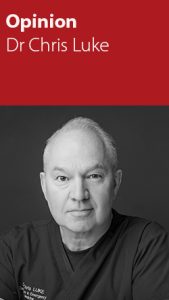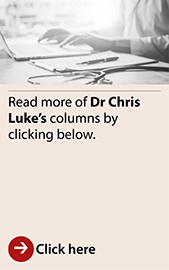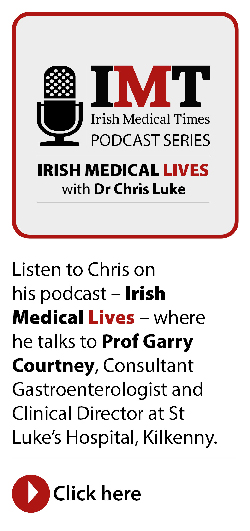Essentially the most interesting side of not too long ago deceased Dr Michael Mosley’s writing and broadcasting was the so-called ‘gonzo journalism’, writes Dr Chris Luke
It is without doubt one of the enduring puzzles posed by my long-ish medical profession: why do some medical doctors appear so blissfully detached to their sufferers’ happiness? My very own default stance as an insecure ‘individuals pleaser’ actually underlies my incomprehension, however I’m absolutely not alone in considering that buyer satisfaction (or consumer contentment) will need to have some significance, past that of easy etiquette, whether or not you’re a instructing hospital clinician-scientist, common practitioner, or a guide surgeon in Harley Road.
 I used to be reminded not too long ago of this thriller when somebody informed me the (true) story of an in depth pal who’d attended a guide’s non-public rooms, late final 12 months, solely to be met by a gruff and impatient surgeon, who was distinctly unsympathetic to her painful plight. And it appears that evidently his terse parting directions to the disconsolate affected person was that she ought to solely come again to see him ‘as soon as (she’d) misplaced a few stone’. So up she bought after the temporary however costly session and, opening the door to depart, she turned to the specialist and stated: “A really Blissful Christmas to you, Mr O’Bloggins and I hope Santa Claus brings you a pleasant new character”, then closed the door behind her, by no means to return.
I used to be reminded not too long ago of this thriller when somebody informed me the (true) story of an in depth pal who’d attended a guide’s non-public rooms, late final 12 months, solely to be met by a gruff and impatient surgeon, who was distinctly unsympathetic to her painful plight. And it appears that evidently his terse parting directions to the disconsolate affected person was that she ought to solely come again to see him ‘as soon as (she’d) misplaced a few stone’. So up she bought after the temporary however costly session and, opening the door to depart, she turned to the specialist and stated: “A really Blissful Christmas to you, Mr O’Bloggins and I hope Santa Claus brings you a pleasant new character”, then closed the door behind her, by no means to return.
I discover that type of story each entertaining and comforting, as a result of working in healthcare can imply coping with troublesome colleagues, for whom concern for sufferers, or comrades, appears to be low on their each day to-do lists. So slightly wry laughter is commonly the one comfort accessible for this actuality (which makes a not insubstantial contribution to emphasize amongst medics).
In reality, a part of the issue with, er, ‘problematic’ colleagues is that there are surprisingly few function fashions inside the occupation (i.e. exemplars of excellent behaviour) whom most medics would regard as such. Clearly, every self-discipline has its personal heroes and heroines, whose observe fashion ‘disciples’ might eagerly emulate: suppose Seamus O’Reilly in oncology, Niall O’Donohoe in neurology, Niall O’Higgins usually surgical procedure, Nuala O’Connor usually observe, Rhona Mahony in obstetrics or Peter Keenan in paediatric emergency medication. I choose these names at random from my private catalogue, and I think about each physician could have his or her personal pantheon of ‘the good and the nice’.
However the query arises: who can all medical doctors admire? Most medics converse just for their very own space of experience, they work together primarily with former classmates or colleagues inside or adjoining to their area, or they’ve a tutorial or semi-political function which limits their ‘attain’ to non-medics and non-colleagues.
That’s most likely why I might nominate the late Dr Michael Mosley – who died tragically throughout a heatwave on the Greek island of Symi earlier this month – as a possible function mannequin for all medics, if solely in the best way they conduct themselves in public and in non-public, the best way they convey, and the influence they’ve on individuals, far and broad.
 Mosley was a British tv journalist, producer, presenter and author who labored for the BBC from 1985 till his dying. He initially toyed with the thought of changing into a priest (his grandfather was an Anglican bishop), tried banking for a few years, and finally educated as a physician on the Royal Free Hospital.
Mosley was a British tv journalist, producer, presenter and author who labored for the BBC from 1985 till his dying. He initially toyed with the thought of changing into a priest (his grandfather was an Anglican bishop), tried banking for a few years, and finally educated as a physician on the Royal Free Hospital.
Nonetheless, a stint in psychiatry so disillusioned him that he determined to not practise medication and joined the BBC as a trainee producer. And thus started a stressed however stellar profession in public broadcasting that might make him the best-known medic in Britain: he was in actual fact a medical-science producer-journalist, and his influence within the Reithian broadcasting sense (‘to tell, educate and entertain’) was fairly spectacular.
As an illustration, Mosley’s 1994 BBC Horizon documentary, Ulcer Wars, reported the hyperlink between Helicobacter pylori and gastric ulcers, which was first found in 1983 by Australian scientists Robin Warren and Barry Marshall. He was subsequently named Medical Journalist of the 12 months in 1995 by the British Medical Affiliation and, in 1996, the programme was stated to have been probably the most vital elements influencing British common practitioners’ prescribing habits.
Within the ensuing a long time, Mosley made vastly well-liked science programmes, with the likes of Robert Winston, John Cleese, and Jeremy Clarkson, a couple of huge vary of matters – together with the neuroscience of character, the function of the face, innovations that modified the world, restoration from battle accidents, train, and the state of the NHS, however it’s most likely his popularising of calorie-restricting diets for which he’s greatest recognized.
The germ of this evangelising mission was a 2011 Horizon programme referred to as Eat, Quick and Dwell Longer through which he realized a couple of type of intermittent fasting, often known as the ‘5:2 weight-reduction plan’, from the neuroscientist Mark Mattson and analysis dietician Michelle Harvie.
Mosley revealed a e-book referred to as The Quick Weight loss program in 2013, setting out a regime whereby consuming as little as 500 energy a day (of ideally ‘Mediterranean’ delicacies) on two days per week may have a dramatically useful influence on well being, together with a significant enchancment in blood sugar, insulin ranges and temper).
I bear in mind shopping for the e-book in Heathrow airport that 12 months, whereas awaiting a flight house, and having learn it utterly by the point the aircraft touched down. And it wasn’t simply me who discovered his writing succinct, good-humoured and persuasive: so too did thousands and thousands of readers of the quite a few books he wrote, which took him to the No 1 slot in non-fiction e-book gross sales on 25 events.
Undoubtedly, probably the most interesting side of Michael Mosley’s writing and broadcasting was the so-called ‘gonzo journalism’. In brief, he personally tried a lot of the well being challenges and interventions he was analysing or recommending.
This meant swallowing tapeworm cysts, sticking a leech on his arm, infesting himself with lice, sipping “fact serum”, and trialling magic mushrooms, along with following the 5:2 weight-reduction plan, when he found that he himself was creating Sort 2 Diabetes (and which he managed to reverse). Thoughts you, whereas the subjective expertise was essential to an important narrative, the nice physician was nonetheless a stickler when it got here to discovering scientific proof for his take-away suggestions.
Dr Mosley was a well-known smiling face on British TV, in recent times, in programmes like Who Made Britain Fats?, Secrets and techniques of Your Massive Store, Belief Me, I’m a Physician, The One Present, and The Reality About Train however, as a radiophile (and a fan of his writing), I got here to admire him most for his BBC Radio 4 sequence, Simply One Factor. This finally comprised over 100 quick podcasts with a quite simple premise:
 “If time is tight, what’s the one factor that try to be doing to enhance your well being and wellbeing? Michael Mosley reveals surprisingly easy prime ideas which are scientifically confirmed to vary your life.”
“If time is tight, what’s the one factor that try to be doing to enhance your well being and wellbeing? Michael Mosley reveals surprisingly easy prime ideas which are scientifically confirmed to vary your life.”
The podcasts really useful one factor everyone may do every day to make themselves really feel – and grow to be – higher, and these ranged from standing on one leg whereas brushing one’s tooth, consuming a pink apple, cooking tomatoes, consuming pink wine, strolling backwards, doing only one ‘plank’ for about 30 seconds a day, volunteering of some type, and – lastly – consuming one’s meals slowly (taking at the very least 10 minutes). Similar to so many grandmothers are ceaselessly saying!
I loved these prime ideas, and I recurrently really useful a lot of them to family and friends and so they have been properly obtained by the viewers of the RTÉ Immediately programme, the place I do a medical slot. What I hadn’t appreciated – till Dr Mosley’s desperately unhappy dying from obvious warmth stroke – was that thousands and thousands of different listeners, viewers and readers additionally cherished attempting them. And judging by the letters, the phone-ins, and TV tributes, numerous lives have been – and proceed to be – impacted for the higher by the adoption of a few of his mild options.
What few realised till he was gone was simply how many individuals cherished him: this ‘sort, humorous, modest, good’ (sic) physician. Many colleagues tearfully informed how he’d helped them on their profession ladder. Others recalled how he’d carried out CPR for a half-hour on somebody till paramedics arrived (and the casualty survived).
And one Guardian letter author wrote: “(he) was a really uncommon physician, one who had all the talents vital to vary human behaviour for the higher, by measurable means, and that may be a very uncommon reward certainly.” I couldn’t agree extra, and I believe time will present that Mosley was probably the most influential medical doctors of the early twenty first century, by way of inhabitants well being (and ‘self-care’). It might additionally show the previous adage: “It’s good to be vital, but it surely’s extra vital to be good”. ![]()